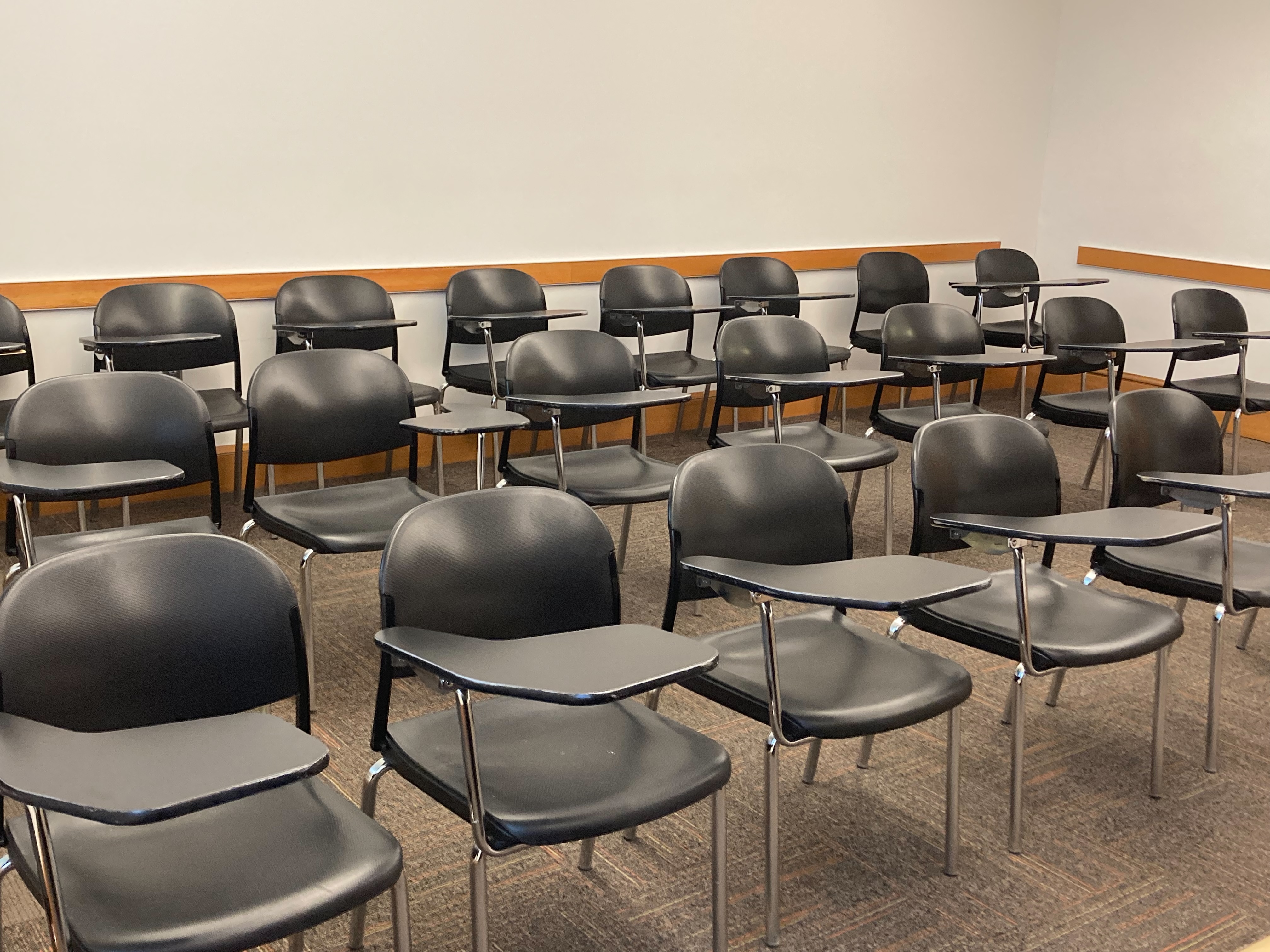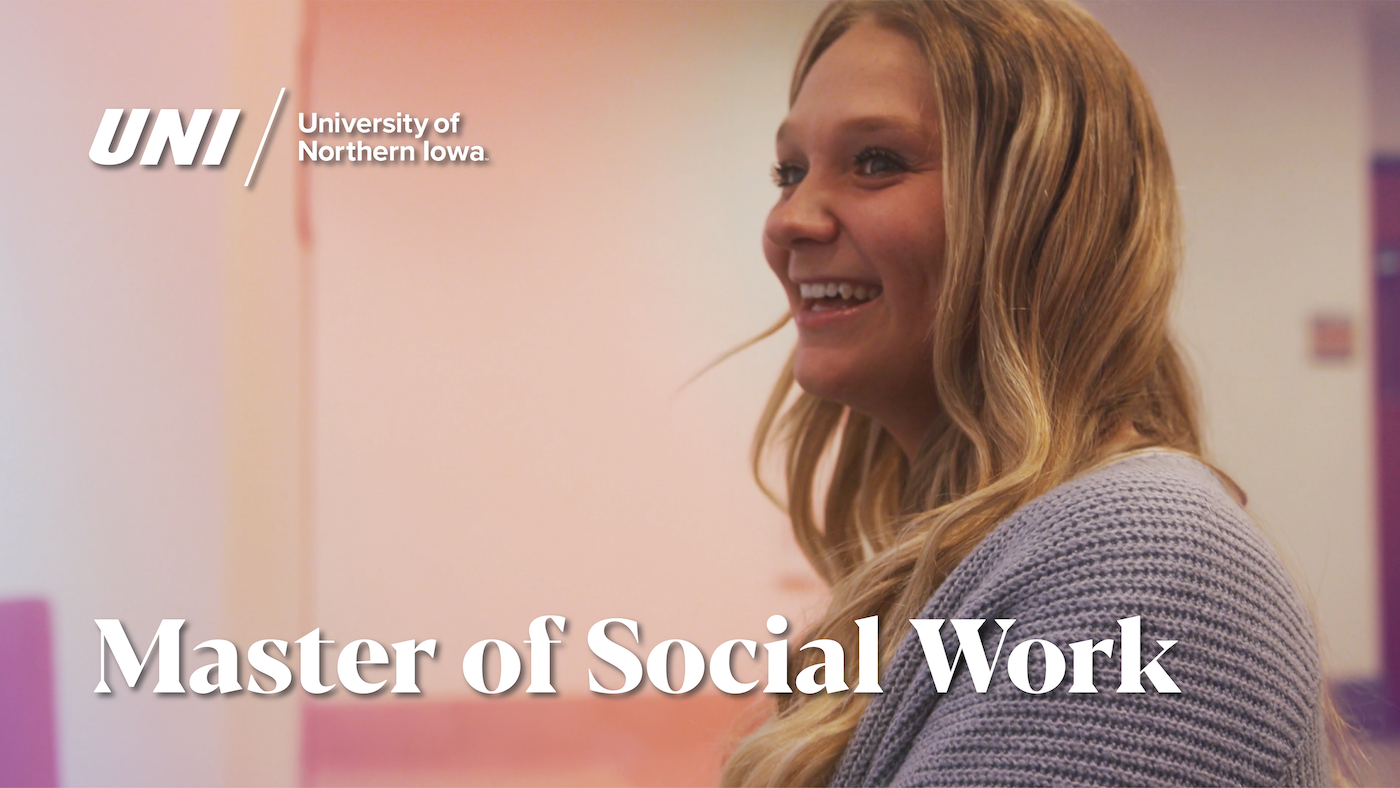Master of Social Work Program
UNI's Master of Social Work (MSW) program is an advanced generalist program with a specialization in Trauma-Informed Care. Our advanced generalist curriculum will prepare you for work across all levels of social work practice (micro, mezzo and macro). If you are seeking a career where you can create social change, fight injustice and address the wide-ranging effects of individual and systemic trauma, then UNI's MSW program is the place for you.
Since 2014, our program has provided a trauma-informed care specialization which is based on decades of research on how people are affected by stress, adversity and oppression. You'll work with scholars and experts in the field of trauma and mental health, gain experience in the field, and will learn innovative approaches to address the complex problems facing our world.

One
& Only
UNI offers the only trauma-informed care specialization MSW program in the state of Iowa.
CSWE
Accredited
Fully accredited by the Council on Social Work Education (CSWE).
93%
Pass Rate
UNI's MSW program is proud to boast a 93% licensure pass rate ... far surpassing the national average of 74%.
MSW at a Glance
- What is Social Work?
At the most basic level, social work involves helping people address struggles in their lives.
Social work is a vast field, which means there are numerous opportunities based on your interests or passions. Some people enter social work already drawn to a specific population or issue, whereas others develop an interest through their coursework and field experiences. Social workers can help with difficulties, transitions or struggles from birth to death and at any point in between.
Some areas of social work practice include (but are not limited to):
- Aging Services/Gerontological SW
- Children and Families
- Child Welfare
- Criminal Justice System (i.e. probation, parole, corrections, public safety, juvenile justice)
- Crisis Intervention
- Disability Advocacy & Support Services
- Domestic Violence
- Education (early childhood, K-12 schools, colleges, and universities)
- Employment/Vocational Services
- Housing Access & Services
- Human Rights
- LGBTQ+ Services
- Lobbying & Policy Advocacy
- Medical SW (including hospitals, clinics, midwifery services, etc.)
- Mental Health Treatment
- Military/Veteran Services
- Non-profit Management and Administration
- Program Evaluation
- SW Research
- Substance Use and Addictions Treatment
- Victim Support Services
Not only are social workers employed in a variety of settings, but they work at different levels of practice, including:
- Micro level (direct practice): Micro level practice involves direct interaction with clients to cope and address their problems. This is the most common type of social work practice and is offered in a variety of settings.
- Mezzo level: Mezzo level social work involves working with groups, which runs the scale from working with family units, groups, organizations, and communities. Social workers frequently work across both the micro and mezzo levels within the same job.
- Macro level: Macro level social work is larger scale, and involves interventions, policy work, and advocacy at larger scale levels, including communities, states, and countries. Macro social work can include activities such as grant-writing, activism, and crafting policies or laws.
- What is Trauma-Informed Care?
Trauma-Informed Care (TIC) is an approach that recognizes the pervasiveness of trauma in the general population and views it as a driving force behind many psychological conditions, physical health ailments, behavioral disorders, public health issues, and systemic racism/oppression. Based on this understanding, the aim of TIC is to reduce the effects of stress, adversity, and trauma in individuals (both clients and providers), families, organizations, and broader systems of practice. It does this by integrating knowledge about trauma into all aspects of services and trains providers to recognize the signs and symptoms of trauma to help minimize the potential for harm and re-traumatization.
Examples of TIC approaches include (but are not limited to):
- Changing organizational policies, procedures and practices to minimize potential barriers to service
- Teaching staff and clients de-escalation protocols, stabilization skills, and stress reduction techniques
- Conducting screening and assessment that identify exposure to trauma and adversity
- Providing trauma-specific interventions to effectively resolve the negative impact of trauma.
UNI offers one of the few trauma-informed care specialization MSW programs in the Midwest, and the only one in the state of Iowa.
- What Does an MSW Offer You?
A Master’s Degree in Social Work (MSW) is an extremely versatile degree option. An MSW offers a much broader range of job options in addition to providing therapy services. Because of that, MSWs tend to receive a higher salary compared to people in the field with an undergraduate degree.
Some people choose to get an MSW in order to be able to practice as a mental health therapist, or what is known as clinical social work. Similar disciplines (e.g. mental health counseling, marriage and family therapy, and psychology) also offer graduate programs that allow the practitioner to provide mental health therapy services. Disciplines differ in their perspective of what causes the problems that people face and how to address those issues. Practicing as a mental health therapist requires licensure by the Iowa Board of Social Workers. An MSW from UNI allows our graduates to sit for the licensure exam to become a Licensed Master's level Social Worker (LMSW).
There are also a wide variety of non-therapy jobs for MSWs. Non-clinical opportunities for MSWs include (but are not limited to) advocacy, program development and management, agency and non-profit administration, and policy makers. UNI'S MSW program is considered a "generalist" program, meaning that it provides a rounded education to prepare our MSWs for a broad range of jobs.
- Our Mission
The mission of the University of Northern Iowa Masters of Social Work Program is to provide students with a trauma-informed foundation that prepares them to identify, evaluate, and address the personal, social, and systemic conditions that perpetuate individual, family, organizational and community-based trauma using evidence-informed interventions. Our curriculum is based on the perspective that effective change within this paradigm requires upholding the dignity and worth of the individual, advocating for human rights and social and economic justice, challenging oppression, promoting human relationships, practicing multi-cultural responsiveness, and identifying factors that mitigate the effects of trauma and enhance strengths, competencies, and resilience. Students obtain an in-depth understanding of these values and practices through in-person and online coursework and instruction that promotes critical thinking, self-reflection, and ethical decision making, along with intensive experiential learning through local, state, national, and international field placements.
What does that mean for our students?
Our curriculum is based on the perspective that social workers are change-makers. Social workers follow a professional code of ethics from the National Association of Social Workers.
Ethically, we believe it is our responsibility as social workers to:
- Treat every person with dignity and worth
- Advocate for human rights, along with social and economic justice
- Challenge oppression, in all its forms
- Promote human relationships
- Recognize and address our own biases
- Practice multi-cultural responsiveness
- Address factors to reduce the effects of trauma
- Recognize the strengths and assets in our clients
- Help clients build resilience
Our curriculum is based on these ethical principles. Through our courses, we want students to develop skills in:
- Critical thinking
- Self-reflection
- Ethical decision-making
Advanced Standing
In-Person
Full-Time, 1 Year
Designed for individuals who have a social work undergraduate degree from a Council on Social Work Education (CSWE) accredited program, and are looking to learn in-person, on the UNI campus.
Part-time study options available.
Next cohort begins every summer.
Annual Application First Consideration Deadline: December 1 at 4:30 p.m.
Applications Open: Sept. 1
Group Interviews (In-person): TBD (early January)
Advanced Standing
Online
Full-Time, 1 Year
Designed for individuals who have a social work undergraduate degree from a Council on Social Work Education (CSWE) accredited program, who would prefer the online learning option.
Part-time study options available.
Next cohort begins every summer.
Annual Application Full Consideration Deadline: December 1 at 4:30 p.m.
Applications Open: Sept. 1
Group Interviews (via Zoom): TBD (early January)
Program Highlights
Our program boasts faculty with extensive experience working in a variety of clinical and agency settings and who are actively conducting research in the areas of mental health, trauma, and other fields.
In addition to your courses, you will have the opportunity to build relationships with our faculty. Many faculty include students in departmental and research projects. Our cohort size allows us to get to know our students, providing mentoring and connection.

Our students have a wide range of field placements opportunities at local, state, national, and even international sites.
We have extensive connections within the Cedar Valley, but also across the state. We are always interested in establishing new connections that will provide meaningful learning opportunities for our students.

Our program boasts faculty with extensive experience working in a variety of clinical and agency settings and who are actively conducting research in the areas of mental health, trauma, and other fields.
In addition to your courses, you will have the opportunity to build relationships with our faculty. Many faculty include students in departmental and research projects. Our cohort size allows us to get to know our students, providing mentoring and connection.

Our students have a wide range of field placements opportunities at local, state, national, and even international sites.
We have extensive connections within the Cedar Valley, but also across the state. We are always interested in establishing new connections that will provide meaningful learning opportunities for our students.

Want to learn more?
Fill out your information here and we'll be in touch!
Contact us directly at:
Department of Social Work
Sabin Hall, Room 235
Cedar Falls, IA 50614
Rebecca Dickinson
MSW Program Director
Phone: 319-273-7859
Email: rebecca.dickinson@uni.edu
Learn More
Looking for more information? Be sure to check out all of our great online resources!


